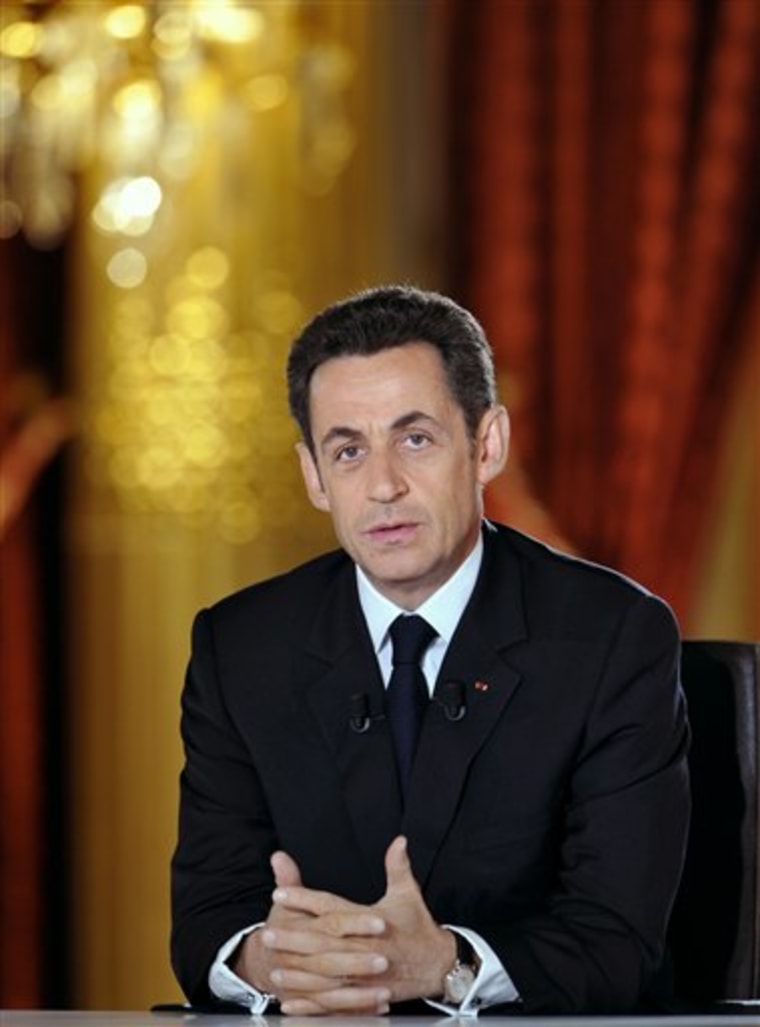President Nicolas Sarkozy blistered financial traders and ruled out bonuses for managers of banks bailed out by state funds as he sought to reassure a nation still jittery following nationwide strikes sparked by the global economic crisis.
Sarkozy proposed a panoply of investment measures, tax cuts, profit sharing and an increase in short-term unemployment benefits during a 90-minute live session with journalists on national television Thursday night.
Dressed in a sober dark blue suit, the French leader was part the comforting parent and part the scold as he outlined proposals that his government will discuss in detail later this month with unions and other social groups to fight growing unemployment and shrinking spending power.
"I must ensure that France enters the crisis as late as possible and gets out of it as early as possible," Sarkozy said.
He called on a joint European response to the crisis, which he said he had discussed in a recent telephone conversation with President Barack Obama.
"I told him that I feel an ally of the United States, but one country cannot lead the world."
Confidence in Sarkozy falls
Polls released Thursday indicated that confidence in the energetic Sarkozy is falling amid frustration over job cuts and taxpayer concern that money used to bail out the financial sector is lining executive pockets.
Sarkozy sternly announced that there would be no bonuses in 2009 at banks that had received state aid. He also said he would consider a cap on salaries for top managers of companies that received public funds but was skeptical about making it a hard-fast rule.
The president's harshest words were reserved for traders whom he accused of fueling speculation.
Sarkozy said he was "more shocked by the system of pay" for traders than he was for bankers. "That's what you have to forbid." He also said France would review its relations with neighboring financial havens such as Luxembourg, Andorra and Monaco.
Fears of broad strikes, protests
Nationwide strikes and protests last week focused on fears over rising unemployment, and the government is worried that the one-day action could turn into a broader and protracted walkout.
Riot police fired tear gas Thursday at a handful of student protesters trying to force their way into the University of Strasbourg in eastern France, police said. Protesters lobbed eggs and shoes at the facade of the new university complex.
Student protests over layoffs and reforms in higher education disrupted several French universities Thursday, though most were peaceful.
Sarkozy, however, said despite the protests in recent weeks that he would press ahead with his reforms.
"Naturally, I will continue to reform the country. This is the mandate I received, it is my duty," Sarkozy said. "It is the only way for France to emerge from the crisis stronger than going into it."
Major reforms put on hold
Prime Minister Francois Fillon said this week that the protests would not lead to a reversal in French economic policy. But even before the recent strikes, major reforms appeared to have been put on hold while the government finds ways to save major industries from collapse.
Sarkozy pledged to eliminate the so-called "professional tax" that he said penalized French companies, including the auto sector, and he promised to try to reverse outsourcing of French industry.
Turning to workers, Sarkozy said he favored a system of profit sharing in enterprises and an increase in short-term unemployment benefits, would consider income tax cuts for lower wage workers, and would look at increasing state allowances for families as well as an increase in child care benefits.
Not everything was on the table, however. Sarkozy ruled out an increase in the minimum wages, saying it would not help enough people.
Part of the government's $33.6 billion economic stimulus plan would go to construction of new university buildings, new high-speed train rails, and improvements in French waterways, including canals.
French economic growth is expected to be close to zero this year. Unemployment is up to 7.7 percent after years of steady decline. The worsening employment outlook has pushed down consumer spending.
More on: Nicolas Sarkozy | France
